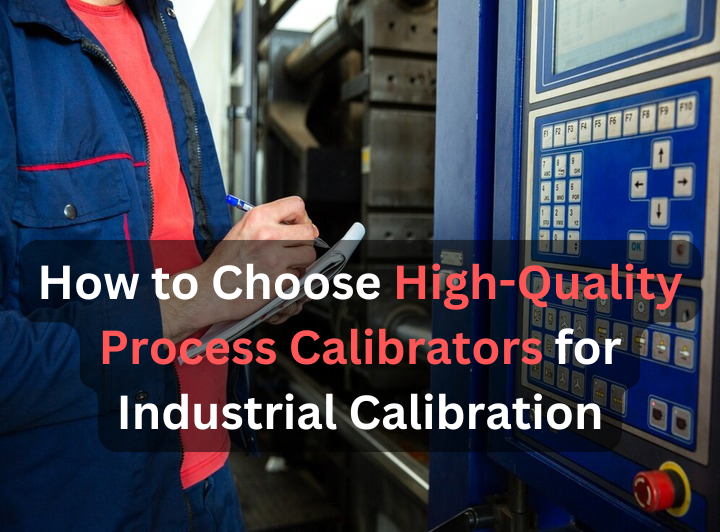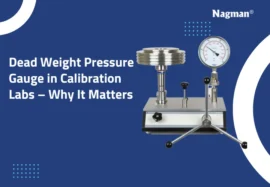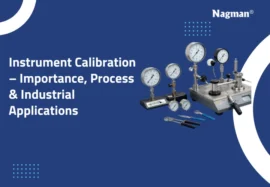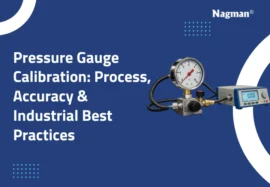Precision and reliability are key aspects of industrial safety, efficiency, and regulatory compliance. A key tool that guarantees the above standards is the process calibrator. Quality process calibrators help in the proper testing and calibration of instruments, leading to high performance and less time off. Choosing a calibrator primarily depends upon the aim of the study. This guide will help you understand some key factors of the right standardization equipment and how Nagman calibration can help you get precise results for your industrial processes.
What are Process Calibrators?
Process calibrators are technologically advanced pieces of equipment whose automated functionality is applied most frequently to check the pockets, verification, or calibration of different industrial instruments such as pressure gauges, temperature sensors, flow meters, and transmitters. It is important to ensure that industrial processes meet very high tolerances. It is highly beneficial for industries such as manufacturing, oil and gas, power generation, and pharmaceuticals, where even the smallest displacement in measurements can be very consequential.
Why is Selecting the Best Calibration Equipment Important?
The choice of process calibrator is crucial since it will enable consistency and accuracy across all the various operating parameters. For example, an accurate pressure controller will ensure correct pressure measurements and provide the lowest errors in dynamically sensitive applications. Here comes the significance of opting for Nagman Calibration, which will pay off with maximum efficiency, reduced adjustment time, and guaranteed conformance with worldwide calibration standards.
Key Considerations for Choosing High-Quality Process Calibrators
While evaluating process calibration devices, here are a few factors to consider so that the best is obtained:
1. Type of Calibration Needed
There are different types of calibrators. Usually, there is a definition using specific applications, such as:
- Pressure calibration: To test the pressure sensor, switch, and/or transmitter.
- Temperature calibration: To calibrate RTDs, thermocouples, and other temperature recorders.
- A multi-functional calibrator: It multi-purposely performs functions such as measuring voltage, current, and frequency.
- Carry out your needs assessment for calibration and go ahead to make a more suitable choice.
2. Accuracy and Precision
The accuracy of a process calibrator is essential when it comes to getting reliable results.
- It is good to seek devices that promise high precision, especially when associated with critical systems.
- A good example would be aprecision pressure controller that can have minimal error ranges so that dependable pressure control is attained.
- Check prior characteristics of the device, such as accuracy percentage, resolution, and repeatability, before making your decision.
3. Ease of Use
Fine-tuning in industries is often involved with more complex processes. Features to look for in these are:
- An inviting interface and control scheme that many operators would be comfortable using.
- Acceptance of different sensors and instruments.
- Light and portable for onsite calibration.
4. Integrated with Calibration Management
The new breed of calibrators will now easily integrate into calibration management systems. This allows for easy tracking, scheduling, and documentation of calibration activities. This would be very welcome in so many industries, as it promotes traceability and reduces the error of miscalibration.
5. Durability and Build Quality
It is not easy to roam in industrial environments, which makes the key consideration of how good and strong the process calibrator should be. A high-quality calibrator should take extreme temperatures, humidity, and physical stress into account; hence, the performance will not suffer under extreme conditions.
6. Scalability and Future-Proofing
Over time, the need for calibration may grow. Therefore, it only seems reasonable to have future-proofing equipment. Such pressure calibrators will have upgradeable firmware, expandable functionalities, and compatibility with new technologies.
7. Manufacturer’s Reputation and Support
A reputed manufacturer should have a long history in the manufacture of reliable, innovative solutions. Also, check for after-sales support on calibration services, technical assistance, and even warranties.
Key Features of Nagman Process Calibrators
Designed for precision calibration of pressure, temperature, and electrical signals
Rugged build to withstand harsh industrial environments
Lightweight and portable models available for on-site usage
Compatible with advanced calibration software for better workflow management
Supports integration with calibration management systems
High-resolution displays and user-friendly interfaces
Why Nagman Calibration is Trusted Across Industries
Over 50+ years of calibration expertise
ISO 9001:2015 certified for quality assurance
Thousands of satisfied clients in power, pharma, oil & gas, and manufacturing sectors
Continuous innovation in process calibrators and test benches
Excellent post-sales support and training
Trusted name in both domestic and international markets
Applications of Nagman Process Calibrators
Calibration of pressure transmitters, RTDs, and thermocouples
Testing of digital pressure indicators and flow meters
Servicing and validation in instrumentation labs
Maintenance of control panels in plant operations
On-site and lab-based process instrumentation calibration
Benefits of Investing in Quality Process Calibrators
Boosts measurement accuracy and process efficiency
Reduces downtime and operational errors
Ensures compliance with industry regulations
Increases lifecycle of instruments and sensors
Saves costs on rework and frequent recalibrations
Benefits of Using High-Quality Process Calibrators
In turning up the Nagman calibration instruments, there are great advantages such as:
- Enhanced Accuracy: High-quality calibrators give accurate measurements, hence limiting operational errors.
- Regulation Compliance: A precise calibration prompts the requirement of the industry and regulatory compliance.
- Increased Effectiveness: A reliable device reduces downtime losses in production processes.
- Reduced Expenditure: Precisely calibrated instruments prevent wasting money on costly breakdowns and repairs.
Conclusion
Selecting the right process calibrators results in measurement accuracy, ease of use, integration capability, and durability. Quality equipment is an investment in reliability and efficiency in the long term. Nagman Instrumentation is an ISO 9001-2015 Certified Instrumentation Company serving since 1972. Our innovative calibrators are best suited for every industry and act as a benchmark for trust and assurance of precision and accuracy. Contact us for any business calibration needs.






